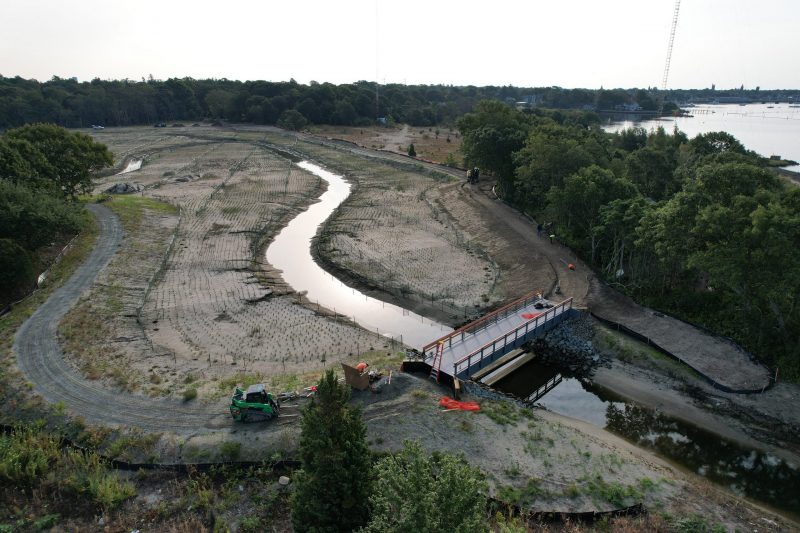Marsh Island Salt Marsh Restoration Celebrates Major Milestone
Construction at Marsh Island, which began nearly one year ago, aims to restore around 11 acres of salt marsh lost since the late 1930s along New Bedford Harbor in Fairhaven. The first phase of the project has revitalized six acres of the salt marsh at the site.
Vice President of Watershed Protection, Brendan Annett, explains, “this is an exciting milestone for our communities, after years of hard work with this group of partners and funders. This ecologically important and beautiful natural piece of New Bedford Harbor is now coming back to life after nearly a century. Like our Acushnet Sawmill site, this is expected to become a treasured asset and destination for people throughout the area.”
“After many years of planning, we are excited to celebrate completion of the first phase of construction to restore salt marsh habitat at Marsh Island. Restoration will improve water quality, benefit wildlife, and increase resilience to climate change for the surrounding coastal community,” said DER Director Beth Lambert. “Restoration relies on partnerships, and this project would not be possible without the vision and leadership of Buzzards Bay Coalition, Fairhaven-Acushnet Land Preservation Trust, the New Bedford Harbor Trustee Council, NOAA, and many other dedicated partners.”

A new pedestrian bridge and tidal creek included in Phase 1 of the Marsh Island Salt Marsh Restoration Project. Photo c/o Lucianos Excavation Inc.
Marsh Island originally contained extensive salt marsh, important to water quality, fish and wildlife in the Harbor and the Bay. Part of the site was then turned into a granite quarry in the 1800s. Between the 1930s and mid-1950s, the site was filled with sediment dredged from New Bedford Harbor navigation channels. The Buzzards Bay Coalition worked with key partners to secure the land for conservation in 2002 and 2007.
“Given its location along the banks of the Acushnet River and New Bedford Harbor, where the impacts of PCB pollution took its toll, the Marsh Island Salt Marsh Restoration Project has been a priority project for the New Bedford Harbor Trustee Council to support,” said Steve Block, Coordinator for the New Bedford Harbor Trustee Council. “It’s fantastic to see Phase 1 complete, and we look forward to moving forward with Phase 2!”
Work to restore the marsh in the southern half of the property is delayed until the active radio towers on the site are relocated. This phase of the project will uncover additional sediment from the filled marsh and restore native plants and tidal flow, improving water quality and wildlife habitat, further expanding the restored marsh. Once completed, the restored salt marsh and tidal creeks will feature a perimeter trail, scenic overlooks, and a trailhead parking area, making this natural gem accessible to the public to enjoy the outdoors.
“NOAA is proud to be supporting this crucial work restoring this important habitat in New Bedford Harbor,” said Carrie Selberg Robinson, director of the NOAA Fisheries Office of Habitat Conservation. “NOAA has for many years worked with the Buzzards Bay Coalition, Massachusetts Division of Ecological Restoration, and other partners to permanently protect this land and restore it to a healthy coastal marsh. We are thrilled that Phase 1 is now complete.”
The project is a conservation partnership of the New Bedford Harbor Trustee Council, NOAA Restoration Center, Massachusetts Department of Fish & Game’s Division of Ecological Restoration, the National Fish & Wildlife Foundation, and the Fairhaven-Acushnet Land Preservation Trust with the Buzzards Bay Coalition.